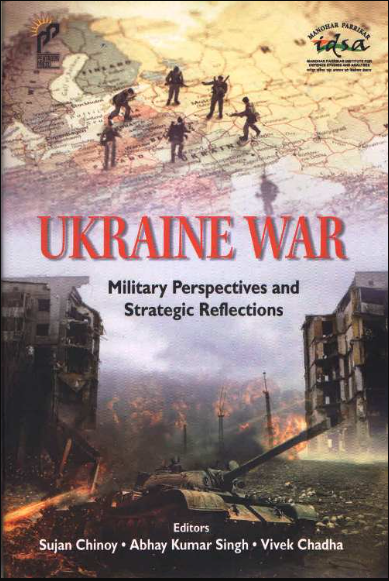Ukraine War: Military Perspectives and Strategic Reflections

Pentagon Press
About the Book
The idea for this book emerged in the course of discussions during the initial stages of the Ukraine War. It was, however, realised that any attempt at drawing lessons prematurely could lead to misleading conclusions. Accordingly, instead of absolutist conjectures, the book is an exercise in identifying broader trends.
Much water has flown under the bridge since then. Along the way, the world has been introduced to an array of new sophisticated weapons, missiles and drones that question the very relevance of established battlefield platforms such as tanks, for instance. In this volume, the contributors address several aspects of the war in an attempt to explain, elaborate and challenge existing notions with the larger aim of drawing lessons for policymakers and professionals alike.
Ukraine War: Military Perspectives and Strategic Reflections, presents a comprehensive assessment of the ongoing conflict. Divided into five sections, the book delves into the geopolitical backdrop of the conflict, highlights its operational narrative, dissects the components of military power, explores the impact of disruptive technologies and examines the strategic ramifications of this ongoing war.
About the Editors
Amb Sujan Chinoy is the Director General of the Manohar Parrikar Institute for Defence Studies and Analyses (MP-IDSA), New Delhi since 2019. A career diplomat from 1981-2018, he was Ambassador to Japan and Mexico, besides doing postings in China, Australia, Saudi Arabia and at the UN. A specialist on China, East Asia and politico-security issues, he anchored negotiations and confidence-building measures (CBMs) with China on the boundary issue from 1996-2000. On deputation to the National Security Council Secretariat (NSCS) from 2008-2012, his expertise covered external and internal security issues. He was the Chair of the Think20 engagement group for India’s G20 Presidency.
Cmde Abhay Kumar Singh (Retd) is a Research Fellow at the Manohar Parrikar IDSA. A frequent contributor to journals and periodicals on geopolitical issues, he has authored a book titled India-China Rivalry: Asymmetric No Longer: An Assessment of China’s Evolving Perceptions of India.
Col Vivek Chadha (Retd) is a Senior Fellow at the Manohar Parrikar IDSA. His research interests include military studies, counter terrorism and indigenous strategic thought. He has authored several books with the recent one titled: CDS and Beyond: Integration of the Indian Armed Forces.
Contents
Introduction
– Sujan Chinoy
SECTION I
OVERVIEW OF THE UKRAINIAN CONFLICT
The Geopolitical Background of the War in Ukraine
– Swasti Rao
Tracking Russia–Ukraine War: A Conflict that Defied Expectations
– Abhay K Singh
SECTION II
ROLE AND IMPACT OF THE VARIOUS COMPONENTS OF MILITARY POWER
Efficacy of Armoured Warfare in the Modern Battlefield
– Amarjit Singh
Impact of Artillery, Precision-Guided Munitions (PGMs)and Missiles
– Deepak Kumar
Role of Airpower in the Russia–Ukraine Conflict
– Anil Golani and Dinesh Kumar Pandey
Significance of Army Air Defence in the Ukraine Conflict
– Akhelesh Bhargava
Maritime Theatre of the Ukraine War
– R Vignesh and Abhay Singh
Salient Lessons Learnt in Operational Logistics in Russia–Ukraine War 2023
– Anil Kapoor
Civil and Militia Mobilisation
– Jason Wahlang
SECTION III
ADVENT OF DISRUPTIVE TECHNOLOGIES
Lessons Learned from the Russia–Ukraine Conflict: Unmanned Systems and Missiles
– Akshat Upadhyay
Understanding Cyberwarfare Dynamics: Insights from the Russia–Ukraine Conflict and Implications for Indian Cybersecurity Strategy
– Krutika Patil
War of Narratives: Weaponisation of Information
– Rajorshi Roy
SECTION IV
STRATEGIC DIMENSIONS OF THE CONFLICT
Impact of Russia’s Military Transformation on the Ukraine Conflict: Lessons for India
– Vivek Chadha
Arming Ukraine: The Dynamics of External Military Support
– S Samuel C Rajiv
The Road to War Termination: Navigating Strategies and War Termination Efforts in Russia–Ukraine War
– Rajneesh Singh
Conclusion
– Abhay Singh and Vivek Chadha








